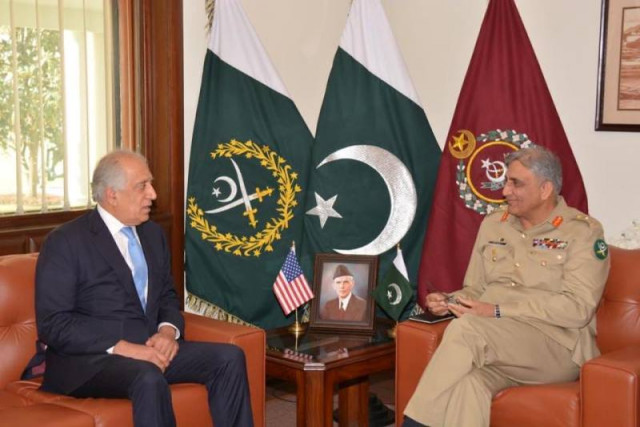US seeks Pakistan's help over new 'Afghan peace plan’
Biden administration wants national elections under transitional Afghan govt which was reportedly rejected by Taliban

The US special envoy for Afghanistan shared with Pakistan the new strategy of the Biden administration, seeking national elections under the transitional Afghan government, officials said on Monday.
The contours of the new strategy were on top of the agenda when Ambassador Zalmay Khalilzad held talks with Army Chief General Qamar Javed Bajwa at the General Headquarters in Rawalpindi.
Khalilzad was accompanied by General Austin Miller, commander of the US forces in Afghanistan, and other officials while General Qamar was assisted by DG Inter-Services Intelligence (ISI) Lt Gen Faiz Hameed, Pakistan special envoy on Afghanistan Muhammad Sadiq and PM Special Assistant on National Security Dr Moeed Yusuf.
Khalilzad’s visit, first under the Biden administration, came against the backdrop of desperate attempts by the US to seek a political end to the war in Afghanistan. Khalilzad flew from Doha where he held talks with the Afghan Taliban.
Earlier, he was in Kabul where he shared the road map developed by the Biden administration to advance the peace process.
Similarly, US Secretary of State Anthony Blinkin wrote a letter to Afghan President Ashraf Ghani, outlining a four-point plan for the Afghan endgame. The plan includes a UN sponsored meeting of foreign ministers of Pakistan, Iran, Russia, US, China and India to adopt a ‘unified approach” on Afghanistan.
The Afghan government was given specific proposals envisaging a new inclusive government leading to comprehensive ceasefire.
In Rawalpindi, Khalilzad, as per official sources, briefed the Pakistani side about the new proposals.
The statement issued by the military’s media wing, however, provided little insight into the meeting. “Matters of mutual interest, regional security and the ongoing Afghanistan reconciliation process were discussed…. The visiting dignitary greatly appreciated Pakistan’s role in the ongoing peace process,” read the Inter-Services Public Relations (ISPR) official handout.
Ambassador Zalmay Khalilzad, US Special Representative for Afghanistan Reconciliation and General Austin Scott Miller, Commander Resolute Support Mission in Afghanistan called on General Qamar Javed Bajwa, Chief of Army Staff (COAS) at GHQ today, says #ISPR pic.twitter.com/b0SF2dwQZe
— The Express Tribune (@etribune) March 8, 2021
Also read: Washington sends chilling message to Kabul
The sources, meanwhile, said Ambassador Khalilzad sought Pakistan’s help in advancing the peace process under the new strategy developed by the Biden administration.
The new US plan is aimed at breaking the deadlock in the slow moving peace negotiations with a road map for a future Afghan government with Taliban representation, a revised Afghan constitution using the current one as an “initial template” and terms for a permanent and comprehensive ceasefire.
The New York Times which obtained the copy of the proposals reported that the Biden administration called for national elections after the establishment of a “transitional peace government of Afghanistan”. The Taliban reportedly rejected the idea of fresh elections, calling them as western interference.
Khalilzad is believed to have requested Pakistan to use its leverage over the Taliban to get the process move forward.
The new US government after taking charge decided to review the Doha deal the Trump administration had signed with the Taliban in February 2020. The deal provides a road map for the US troops’ withdrawal in return for the Taliban not allowing Afghan soil to be used again by the terrorists as well as entering into the intra-Afghan talks.
Under the agreement, all US and other international forces are to leave Afghanistan by May 1. The Biden administration and the Nato countries, which also have troops presence in Afghanistan, indicated that they might not stick to the plan.
The Taliban have been accused of violating the terms of agreement and the US and Nato insisted that troops drawdown is conditioned based.
But the letter written by the US secretary of state suggested that the Biden administration has not ruled out the possibility of leaving Afghanistan by May 1.
Observers believe that the Biden administration appears to think that the Ghani administration is creating impediments to the peace deal and hence it has been given a clear message that the US might leave Afghanistan if Kabul did not respond positively to the new plan.


















COMMENTS
Comments are moderated and generally will be posted if they are on-topic and not abusive.
For more information, please see our Comments FAQ